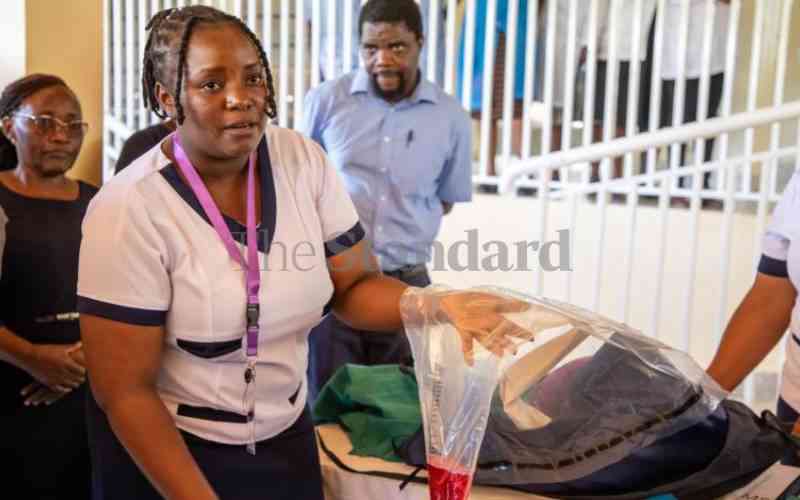The coronavirus disease is making policy makers rethink national priorities and increase investment in the health systems. We have seen reports of counties spending more on their development budget, purchasing beds and personal protective equipment, and national and county governments hiring additional health workers.
Such investments in health facilities in the long-term will benefit the county health facilities, including mother and child health services once the coronavirus pandemic is over.
Despite the potentially positive impacts in responding to the current crisis, there are fears the focus on managing the Covid-19 situation may affect further the delivery of maternal and child health services.
Health and nutrition service delivery in the Maternal Child Health and Nutrition (MCHN) programme is now under threat as focus is shifting toward prevention and treatment of Covid-19.
Malnutrition has, for a long time, been a public health concern due to the high mortality and morbidity rates among children under five.
However, the prevention and treatment of malnutrition seems to be receiving less attention as the emphasis is now more on preparedness to cope with the expected rise in corona cases.
Ensuring good nutritional status of the community at large with special emphasis on the vulnerable members of society helps achieve healthy lifestyle and averts mortality and morbidity rates among women and children.
Services like immunisation, the safe delivery of babies, nutrition and anthropometric (measurements and proportions of the human body) measurements may be affected further in a number of ways.
A concern for many Kenyans is the lack of access to reproductive healthcare, including access to family planning services.
Two indicators – maternal deaths and an unmet need for family planning – highlight some of the reasons for this concern.
Although Kenya has made great strides in reducing maternal deaths, the country still records unacceptably high figure of 6,300 women dying every year during pregnancy and childbirth. A major contributing factor to maternal deaths is unplanned pregnancy exacerbated by the lack of family planning services.
There are now challenges in conducting anthropometric assessments by nutritionists and health care workers due to fear of contracting covid-19.
Likewise, there may be a reduction in seeking MCHN services and postnatal care visits by mothers because of fear of exposing their children to the virus. This may in turn lead to missing out on malnutrition cases and result into late interventions regarding malnourished children.
There is also a danger of mothers missing appointments and a resultant defaulting of malnutrition cases that were being monitored.
The loss of income sources among women as a result of the lockdown and curfew may also result in poor food choices and nutrition of pregnant women.
Stay informed. Subscribe to our newsletter
Further, the failure to attend antenatal and postnatal care visits could also be exacerbated because of the fear of being caught by police and the threat of being taken to a quarantine facility as punishment for flaunting curfew laws.
There could also be difficulties in accessing reproductive and maternal healthcare services as health facilities slowly become overwhelmed with the increase in the number of Covid-19 cases.
In addition, we might see cases of diversion and reorganisation of county financial and personnel resources already budgeted for and prioritised to support maternal child health, nutrition services and reproductive health services to manage the pandemic should the numbers surge. Thus a strain on the county health finances will be felt, which may further affect the delivery of maternal and child health services and reproductive health services, and lead to increased maternal mortality rates.
As the Covid-19 pandemic forces governments and policy makers to rethink their health systems and related services such as family planning, given the potential impact in the short and long term, maternal child health and nutrition services must not be compromised and should continue to be a priority.
More research and advocacy is needed into the impact of Covid-19 on maternal and child health and lessons must be drawn as to how we can revamp the healthcare system to improve it so that the lives of children and mothers are not lost.
Ms Magero is a trained nutritionist and public policy and budgeting expert
 The Standard Group Plc is a
multi-media organization with investments in media platforms spanning newspaper
print operations, television, radio broadcasting, digital and online services. The
Standard Group is recognized as a leading multi-media house in Kenya with a key
influence in matters of national and international interest.
The Standard Group Plc is a
multi-media organization with investments in media platforms spanning newspaper
print operations, television, radio broadcasting, digital and online services. The
Standard Group is recognized as a leading multi-media house in Kenya with a key
influence in matters of national and international interest.
 The Standard Group Plc is a
multi-media organization with investments in media platforms spanning newspaper
print operations, television, radio broadcasting, digital and online services. The
Standard Group is recognized as a leading multi-media house in Kenya with a key
influence in matters of national and international interest.
The Standard Group Plc is a
multi-media organization with investments in media platforms spanning newspaper
print operations, television, radio broadcasting, digital and online services. The
Standard Group is recognized as a leading multi-media house in Kenya with a key
influence in matters of national and international interest.








